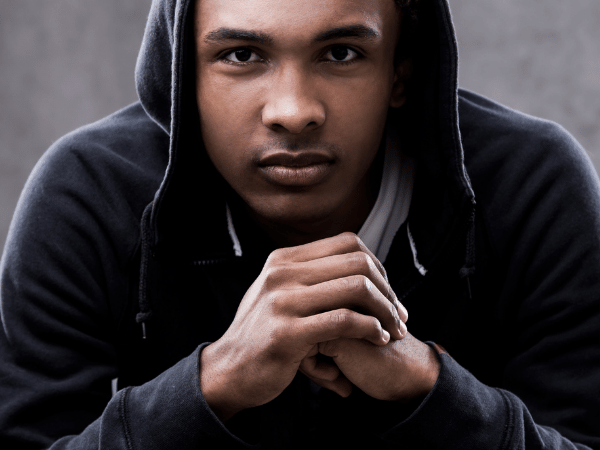With the pandemic still surging at home and abroad, and with lockdowns regulated off and on for the past year, one thing that is apparent. It is that dealing with mental health issues in a constructive way is paramount to living a balanced lifestyle in a rather unbalanced time. There is one group of Americans that seems to suffer from mental health more so than any other: African Americans. The decline in mental health for the African American community has many contributors including the stigma surrounding mental health in the Black community, as well as many race-related stressors.
Stigma of Mental Illness in the African American Community
Stigma is a mark of disgrace associated with a particular circumstance, quality, or person. In regards to mental health and mental illness, stigma usually stems from a lack of understanding about the topic. It then leads to fear, and avoidance. This stigma also stems from misguided information from family or the community at large. With negative community outlooks about mental health or self-stigma, it creates inner shame. This gives the feeling that people with mental health issues have regarding their own condition. Studies show that people who hold to their stigmatic beliefs, or the prevailing stigma of their community, are less likely to seek help for mental health issues.
Introducing Dee and His Thoughts on Black Mental Health Stigma
I sat down with a good friend of mine that I’ve known for around 7 years, we’ll call him “Dee”, and I spoke with him about these issues facing the Black community. Dee is an actor, and a 6’7” Black man. He is an imposing figure who, in public, is either recognized for his work or somewhat feared. He speaks with sincerity and authenticity and is the type of person to give you his undivided attention no matter the surroundings. As we sat on my patio, I shared what researchers had found.
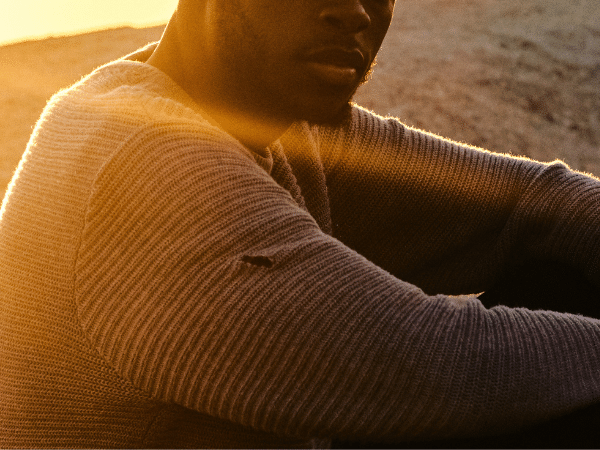
A study from 2006 showed that African Americans were more likely to feel shame. They also have the sensation or feeling of inadequacy when it comes to both mental health trouble, and seeking help. Most of the research participants claimed that stigma was a major issue in their communities (Matthews AK, Corrigan PW, Smith BM, Aranda F.). Another study from 2004 showed that African Americans were in fear of how others in the community might look at them if they sought treatment.
This resonated with Dee.
“Black people don’t talk about it. We don’t talk about mental health. And if we ever do, it’s for negative reasons,” he said. “Getting help looks bad on you, because asking for help shows weakness and lack of self-reliance. For some reason, a lot of Black men are afraid to show these things, and I think it’s maybe because of what we’ve been through over the past centuries. But you know me, though, I’m different. I’m liberal, I’m very free with my emotions, I cry when I need to, I talk to friends about the hardest things to talk about. I’m an actor, and so I found the strongest thing I could do was go to my weakest points and explore them and work them out…”
Stigma Around Mental Health in the Black Community
He points out how families perpetuate the stigma:
“But Black people aren’t like that- where they suffer inside and just go talk to someone. I have a relative who has some problems, and no matter how much I tell his mother that it’s okay for him to see someone, she says “Well, he can talk to me”. But that’s not the point.” Dee says that, “for Black people, it’s all about how you’re perceived. You know, what you present on the outside. We might be in money trouble, but we have that Bently that shows the world we’re not drowning in debt. Same goes for mental health.
What you present on the outside is more important than what’s (tapping the side of his head) going on inside. If you talk to someone, a therapist or a psychiatrist, you think you look weak or you’re seen as crazy. A lot of the black community don’t really understand that everyone else does it with no problems. Most of my white friends, my Asian friends, Hispanic, they all talk to someone, and everyone knows it and everyone is okay with it. Mental illness and mental health used to be taboo for every race, but in, like, one or two generations it went from being seen as bad to being seen as the norm… except for in the black community.”
Mental Health Misinformation
Research shows how Dee’s observations about perception in his community play out in access to care. One study found that the participants believed that if they were placed into inpatient care for mental health, rather than seeking help themselves, they wouldn’t be perceived as having serious mental health issues. The association between treatment and mental illness discounts the spectrum of mental health issues. It prevents someone from seeking help for depression for fear of seeming severely mentally ill. This harkens back to misinformation, or misguided information. Which research suggests has been perpetuated in black families and communities over generations.
Dee’s response was as follows:
Dee: “Yeah, that makes sense. Again, a lot of black people don’t want to be personally perceived in a negative way, like they can’t take care of their own business, so the symptoms of maybe a weaker form of depression or anxiety aren’t shown on the outside. They hold it in and try to deal with it themselves or with their family so they aren’t seen as strange by everyone else. So when it comes to seeing someone with really big issues, the ones who take medication or get therapy, those people get shunned, or looked down on as crazy even though they take the right steps to get better. Like, don’t hang around with auntie because she’s sick in the head, or don’t hang around your cousin because he needs to take medication because he’s crazy.
All along you could be suffering from anxiety or depression, or the onset of something like schizophrenia, and you hold it in and try to manage it because you don’t want everyone else to look at you negatively. And that’s the last thing people in the black community should do.”
Race-Related Stressors for African Americans
Discrimination
In order to understand the unique Black experience as it relates to mental health care, we must look at the unique Black experience in America. A 2013 review of 121 studies examined the link between discrimination and mental health. It showed that experiences of discrimination relates to poorer mental health in a staggering 76% of children under the age of 18 (Priest et. al.).
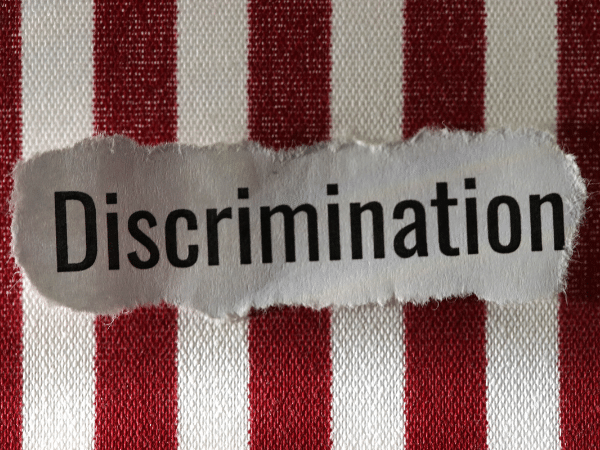
Just a short time earlier, in 2006, findings in Georgia about adolescents aged 10 to 12. They found that the higher the exposure to discrimination someone experienced, the deeper the volume of depressive symptoms they displayed. Though there was no gender difference in depressive symptoms, the boys were more likely to display conduct problems.
Uneven Numbers of Lost Lives
Another race-related stressor is the fact that black Americans carry uneven numbers of lives lost in the community, as evidenced in an article entitled Stress and the Mental Health of Populations of Color: Advancing Our Understanding of Race-related Stressors by Dr. David R. Williams. In it, Williams succinctly outlines Deborah Umberson’s approach to researching group-mourning. It shows that “… a consequence of the large racial differences in life expectancy compared to whites, black Americans are exposed to more deaths of friends and relatives from early childhood through late life and to more losses earlier in the life course.
For example, compared with whites, black children are three times as likely to lose a mother by age 10, and black adults are more than twice as likely to lose a child by age 30, and a spouse by age 60. Umberson indicates that this elevated rate of bereavement and loss of social ties is a unique stressor that adversely affects levels of supportive social ties and mental (and physical health) across the life course (Umberson 2017).”
Childhood Trauma and Trauma from Aggressive Police Encounters
Knowing what we know about trauma and Adverse Childhood Experiences, it is clear how exposure to such loss and violence during development plays out in the onset of mental health and substance use disorders, along with other health and medical issues. Trauma in childhood and early adulthood increases a person’s likelihood of depressive symptoms and suicidal ideation.
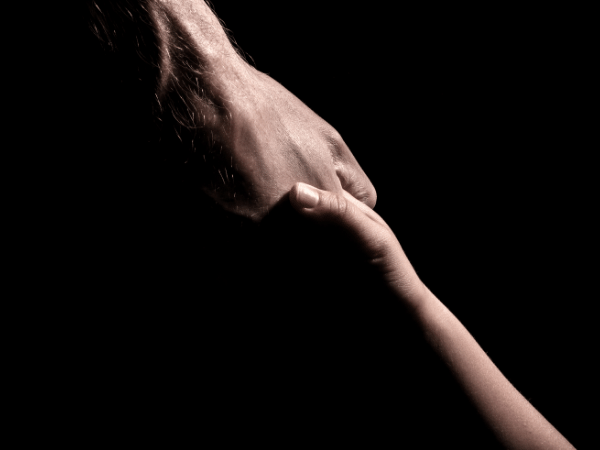
Aggressive police encounters are another source of trauma and stress that disproportionately affect black Americans. A 2014 Geller et. al. study of males between the ages of 18 and 26 showed that a higher frequency of stops and more intrusive police behavior led to a higher correlation to symptoms of anxiety and PTSD. Once the study was sectioned into race, public housing, and education, the numbers of how many times stopped and how intrusive the police behavior was, became disproportionately higher for Black males.
According to the NAACP, “Police killings of unarmed Black Americans are responsible for more than 50 million additional days of poor mental health per year among Black Americans. This mental health burden is comparable to that associated with diabetes. It is a disease that strikes 1 in 5 Black Americans.” Black men are also five times more likely to be incarcerated than their White counterparts. And one out of every three Black boys will be incarcerated in their lifetime (compared to 1:17 White boys).

Decline of Mental Health for Black Americans
Admittedly, the reality of the world is not the best one as of late. However, the statistics tallied by medical and psychological professionals show a reality for black Americans that many, other than themselves, cannot feel or see. It is a reality that is under constant stress. It is a reality that still sees race-related stressors as a major contributor to the decline of mental health. Reddit user u/funkyscienceclass sums up what some of these race-related stressors can do to a black man in America. This comes from a post on r/povertyfinance from March 22nd, 2021. Though the post is truncated here, the sentiment remains:
“… Being a “Hood dude” means your psychology is different. The hood isn’t a place. It’s a tool to disenfranchise… This doesn’t mean you’re stupid, or not deserving. But it means you communicate differently emotionally…
Unless you grew up seeing your family killed, seeing your friends killed, not eating for days (or only eating chips and candy)…
Seeing the women around you molested, having a decrepit visual of blight everywhere you go…
And being indoctrinated to participate in the black market economy (crime) from a young age, and all with no father around…
You won’t understand.
…Bettering myself is so hard. So f***ing hard, man. I’m drowning. White (people’s) keys to success aren’t working for me. I’m scattered and lost. And alone. Contemplated suicide last week for the first time…”
Conclusion
I had read Dee the rest of the information, and the excerpt from u/funkyscieneclass’s post. Afterwhich, I showed him one last subsection:
A study from 2015 done by Bridge et. al. showed that from 2008 to 2012 suicide rates in the black community had more than doubled. While the rates for other races had either plateaued or- in the case of whites- gone down. Suicide is becoming more and more prevalent. It is now the third-highest cause of death for African Americans aged 15 to 24.
Me: After reading all of this, and knowing that I’m going to use your words in the article, is there anything you’d like to say to your African American community?
Message to the African American Community
Dee: “I think I’d tell them that it’s okay. It’s okay to talk to a professional about mental health. It’s okay to ask for help. It doesn’t make you less of a person to try and understand, and treat what’s going on. White people do it all the time and no one bats an eye. It doesn’t show weakness. It doesn’t show that you’re less of a man for not handling your own business.
All that kind of stigma about mental health and mental illness is just a story. A fairytale that no one else listens to, so why do we? We live in extremely stressful conditions… extremely stressful, and if you’re suffering from depression, anxiety. But whatever the case may be, you cannot actually take care of yourself the way you think you can.
Talk to someone. Ask for help. Be the one to set the example that says you’re not crazy. Even if you’re taking the same steps that every other group takes to better themselves. Be the example that says that seeking help for mental health may be one of the hardest things you can do, but it’s also the most courageous, and ultimately one of the strongest things you can do for yourself, your loved ones, and the black community.”
It’s Okay To Ask For Help
“Talk to someone. Ask for help.”
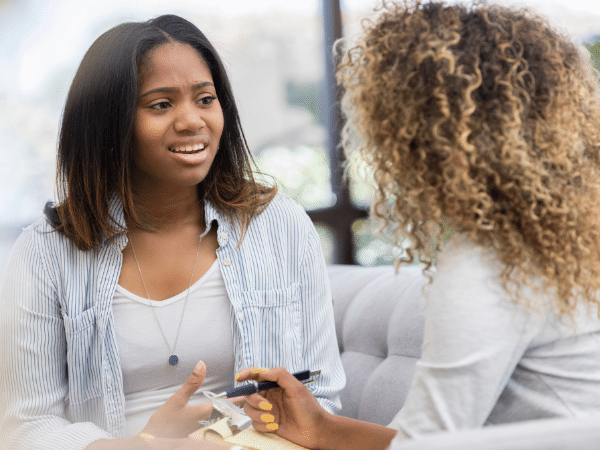
Seeking help for mental health is not a sign of weakness. We at Roots provide a supportive environment in Long Beach, California, free from discrimination. That’s because we care about your holistic wellness. If you want to take the first bold step towards your healing, our experienced and compassionate staff will be here to guide you all the way through recovery. You may call us at 866-766-8776 or schedule a call with us. Your mental health matters.


